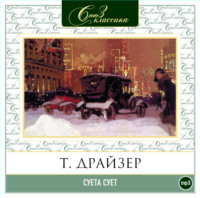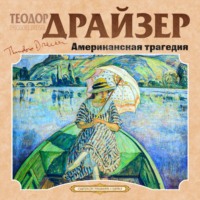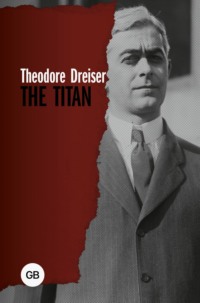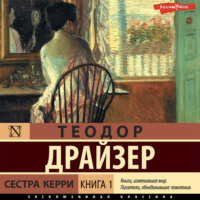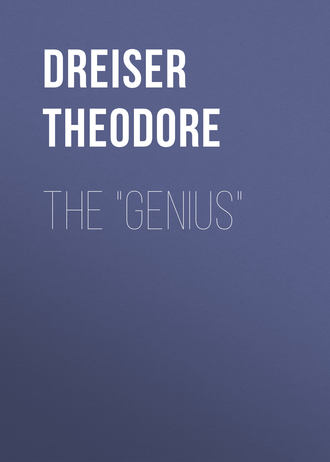 полная версия
полная версияThe "Genius"
The two youngest of her girls were in a fashionable boarding school at Tarrytown; the boy, Kinroy, was preparing for Harvard; Suzanne, the eldest, was at home, fresh from boarding school experiences, beginning to go out socially. Her début had already been made. Suzanne was a peculiar girl, plump, beautiful, moody, with, at times, a dreamy air of indifference and a smile that ran like a breath of air over water. Her eyes were large, of a vague blue-gray, her lips rosy and arched; her cheeks full and pink. She had a crown of light chestnut hair, a body at once innocent and voluptuous in its outlines. When she laughed it was a rippling gurgle, and her sense of humor was perfect, if not exaggerated. One of those naturally wise but as yet vague and formless artistic types, which suspect without education, nearly all the subtleties of the world, and burst forth full winged and beautiful, but oh, so fragile, like a butterfly from its chrysalis, the radiance of morning upon its body. Eugene did not see her for a long time after he met Mrs. Dale, but when he did, he was greatly impressed with her beauty.
Life sometimes builds an enigma out of common clay, and with a look from a twelve-year-old girl, sets a Dante singing. It can make a god of a bull, a divinity of an ibis, or a beetle, set up a golden calf to be worshipped of the multitude. Paradox! Paradox! In this case an immature and yet nearly perfect body held a seemingly poetic and yet utterly nebulous appreciation of life – a body so youthful, a soul so fumbling that one would ask, How should tragedy lurk in form like this?
A fool?
Not quite, yet so nebulous, so much a dreamer that difficulty might readily follow in the wake of any thoughtless deed.
As a matter of fact, favored as she was by nature and fortune, her very presence was dangerous – provocative, without thought of being so. If a true artist had painted her, synthesizing her spirit with her body, he might have done so showing her standing erect on a mountain top, her limbs outlined amidst fluttering draperies against the wind, her eyes fixed on distant heights, or a falling star. Out of mystery into mystery again, so she came and went. Her mind was not unlike a cloud of mist through which the morning sun is endeavoring to break, irradiating all with its flushes of pink and gold. Again it was like those impearled shells of the South Sea, without design yet suggestive of all perfections and all beauties. Dreams! dreams! – of clouds, sunsets, colors, sounds which a too articulate world would do its best later to corrupt. What Dante saw in Beatrice, what Abélard saw in Héloïse, Romeo in Juliet, so some wondering swain could have seen in her – and suffered a like fate.
Eugene encountered Mrs. Dale at a house party on Long Island one Saturday afternoon, and their friendship began at once. She was introduced to him by Colfax, and because of the latter's brusque, jesting spirit was under no illusions as to his social state.
"You needn't look at him closely," he observed gaily, "he's married."
"That simply makes him all the more interesting," she rippled, and extended her hand.
Eugene took it. "I'm glad a poor married man can find shelter somewhere," he said, smartly.
"You should rejoice," she replied. "It's at once your liberty and your protection. Think how safe you are!"
"I know, I know," he said. "All the slings and arrows of Miss Fortune hurtling by."
"And you in no danger of being hurt."
He offered her his arm, and they strolled through a window onto a veranda.
The day was just the least bit dull for Mrs. Dale. Bridge was in progress in the card room, a company of women and girls gambling feverishly. Eugene was not good at bridge, not quick enough mentally, and Mrs. Dale did not care much for it.
"I have been trying to stir up enough interest to bring to pass a motor ride, but it doesn't work," she said. "They all have the gambling fever today. Are you as greedy as the others?"
"I'm greedy I assure you, but I can't play. The greediest thing I can do is to stay away from the tables. I save most. That sharp Faraday has cleaned me and two others out of four hundred dollars. It's astonishing the way some people can play. They just look at the cards or make mystic signs and the wretched things range themselves in serried ranks to suit them. It's a crime. It ought to be a penitentiary offense, particularly to beat me. I'm such an inoffensive specimen of the non-bridge playing family."
"A burnt child, you know. Stay away. Let's sit here. They can't come out here and rob you."
They sat down in green willow chairs, and after a time a servant offered them coffee. Mrs. Dale accepted. They drifted conversationally from bridge to characters in society – a certain climber by the name of Bristow, a man who had made a fortune in trunks – and from him to travel and from travel to Mrs. Dale's experiences with fortune hunters. The automobile materialized through the intervention of others, but Eugene found great satisfaction in this woman's company and sat beside her. They talked books, art, magazines, the making of fortunes and reputations. Because he was or seemed to be in a position to assist her in a literary way she was particularly nice to him. When he was leaving she asked, "Where are you in New York?"
"Riverside Drive is our present abode," he said.
"Why don't you bring Mrs. Witla and come down to see us some week-end? I usually have a few people there, and the house is roomy. I'll name you a special day if you wish."
"Do. We'll be delighted. Mrs. Witla will enjoy it, I'm sure."
Mrs. Dale wrote to Angela ten days later as to a particular date, and in this way the social intimacy began.
It was never of a very definite character, though. When Mrs. Dale met Angela she liked her quite well as an individual, whatever she may have thought of her as a social figure. Neither Eugene nor Angela saw Suzanne nor any of the other children on this occasion, all of them being away. Eugene admired the view tremendously and hinted at being invited again. Mrs. Dale was delighted. She liked him as a man entirely apart from his position but particularly because of his publishing station. She was ambitious to write. Others had told her that he was the most conspicuous of the rising figures in the publishing world. Being friendly with him would give her exceptional standing with all his editors. She was only too pleased to be gracious to him. He was invited again and a third time, with Angela, and it seemed as though they were reaching, or might at least reach, something much more definite than a mere social acquaintance.
It was about six months after Eugene had first met Mrs. Dale that Angela gave a tea, and Eugene, in assisting her to prepare the list of invitations, had suggested that those who were to serve the tea and cakes should be two exceptionally pretty girls who were accustomed to come to the Witla apartment, Florence Reel, the daughter of a well-known author of that name and Marjorie Mac Tennan, the daughter of a well-known editor, both beautiful and talented, one with singing and the other with art ambitions. Angela had seen a picture of Suzanne Dale in her mother's room at Daleview on Grimes Hill, and had been particularly taken with her girlish charm and beauty.
"I wonder," she said, "if Mrs. Dale would object to having Suzanne come and help serve that day. She would like it, I'm sure, there are going to be so many clever people here. We haven't seen her, but that doesn't matter. It would be a nice way to introduce herself."
"That's a good idea, I should say," observed Eugene judicially. He had seen the photo of Suzanne and liked it, though he was not over-impressed. Photos to him were usually gross deceivers. He accepted them always with reservations. Angela forthwith wrote to Mrs. Dale, who agreed. She would be glad to come herself. She had seen the Witla apartment, and had been very much pleased with it. The reception day came and Angela begged Eugene to come home early.
"I know you don't like to be alone with a whole roomful of people, but Mr. Goodrich is coming, and Frederick Allen (one of their friends who had taken a fancy to Eugene), Arturo Scalchero is going to sing and Bonavita to play." Scalchero was none other than Arthur Skalger, of Port Jervis, New Jersey, but he assumed this corruption of his name in Italy to help him to success. Bonavita was truly a Spanish pianist of some repute who was flattered to be invited to Eugene's home.
"Well, I don't care much about it," replied Eugene. "But I will come."
He frequently felt that afternoon teas and receptions were ridiculous affairs, and that he had far better be in his office attending to his multitudinous duties. Still he did leave early, and at five-thirty was ushered into a great roomful of chattering, gesticulating, laughing people. A song by Florence Reel had just been concluded. Like all girls of ambition, vivacity and imagination, she took an interest in Eugene, for in his smiling face she found a responsive gleam.
"Oh, Mr. Witla!" she exclaimed. "Now here you are and you just missed my song. And I wanted you to hear it, too."
"Don't grieve, Florrie," he said familiarly, holding her hand and looking momentarily in her eyes. "You're going to sing it again for me. I heard part of it as I came up on the elevator." He relinquished her hand. "Why, Mrs. Dale! Delighted, I'm sure. So nice of you. And Arturo Scalchero – hullo, Skalger, you old frost! Where'd you get the Italian name? Bonavita! Fine! Am I going to hear you play? All over? Alas! Marjorie Mac Tennan! Gee, but you look sweet! If Mrs. Witla weren't watching me, I'd kiss you. Oh, the pretty bonnet! And Frederick Allen! My word! What are you trying to grab off, Allen? I'm on to you. No bluffs! Nix! Nix! Why, Mrs. Schenck – delighted! Angela, why didn't you tell me Mrs. Schenck was coming? I'd have been home at three."
By this time he had reached the east end of the great studio room, farthest from the river. Here a tea table was spread with a silver tea service, and behind it a girl, oval-faced, radiantly healthy, her full lips parted in a ripe smile, her blue-gray eyes talking pleasure and satisfaction, her forehead laid about by a silver filigree band, beneath which her brown chestnut curls protruded. Her hands, Eugene noted, were plump and fair. She stood erect, assured, with the least touch of quizzical light in her eye. A white, pink-bordered dress draped her girlish figure.
"I don't know," he said easily, "but I wager a guess that this is – that this is – this is Suzanne Dale – what?"
"Yes, this is," she replied laughingly. "Can I give you a cup of tea, Mr. Witla? I know you are Mr. Witla from ma-ma´'s description and the way in which you talk to everybody."
"And how do I talk to everybody, may I ask, pleasum?"
"Oh, I can't tell you so easily. I mean, I can't find the words, you know. I know how it is, though. Familiarly, I suppose I mean. Will you have one lump or two?"
"Three an thou pleasest. Didn't your mother tell me you sang or played?"
"Oh, you mustn't believe anything ma-ma´ says about me! She's apt to say anything. Tee! Hee! It makes me laugh" – she pronounced it laaf – "to think of my playing. My teacher says he would like to strike my knuckles. Oh, dear!" (She went into a gale of giggles.) "And sing! Oh, dear, dear! That is too good!"
Eugene watched her pretty face intently. Her mouth and nose and eyes fascinated him. She was so sweet! He noted the configuration of her lips and cheeks and chin. The nose was delicate, beautifully formed, fat, not sensitive. The ears were small, the eyes large and wide set, the forehead naturally high, but so concealed by curls that it seemed low. She had a few freckles and a very small dimple in her chin.
"Now you mustn't laugh like that," he said mock solemnly. "It's very serious business, this laughing. In the first place, it's against the rules of this apartment. No one is ever, ever, ever supposed to laugh here, particularly young ladies who pour tea. Tea, Epictetus well says, involves the most serious conceptions of one's privileges and duties. It is the high-born prerogative of tea servers to grin occasionally, but never, never, never under any circumstances whatsoever – " Suzanne's lips were beginning to part ravishingly in anticipation of a burst of laughter.
"What's all the excitement about, Witla?" asked Skalger, who had drifted to his side. "Why this sudden cessation of progress?"
"Tea, my son, tea!" said Eugene. "Have a cup with me?"
"I will."
"He's trying to tell me, Mr. Skalger, that I should never laaf. I must only grin." Her lips parted and she laughed joyously. Eugene laughed with her. He could not help it. "Ma-ma´ says I giggle all the time. I wouldn't do very well here, would I?"
She always pronounced it "ma-ma´."
She turned to Eugene again with big smiling eyes.
"Exceptions, exceptions. I might make exceptions – one exception – but not more."
"Why one?" she asked archly.
"Oh, just to hear a natural laugh," he said a little plaintively. "Just to hear a real joyous laugh. Can you laugh joyously?"
She giggled again at this, and he was about to tell her how joyously she did laugh when Angela called him away to hear Florence Reel, who was going to sing again for his especial benefit. He parted from Miss Dale reluctantly, for she seemed some delicious figure as delicately colorful as Royal Dresden, as perfect in her moods as a spring evening, as soft, soulful, enticing as a strain of music heard through the night at a distance or over the water. He went over to where Florence Reel was standing, listening in a sympathetic melancholy vein to a delightful rendering of "The Summer Winds Are Blowing, Blowing." All the while he could not help thinking of Suzanne – letting his eyes stray in that direction. He talked to Mrs. Dale, to Henrietta Tenmon, to Luke Severas, Mr. and Mrs. Dula, Payalei Stone, now a writer of special articles, and others, but he couldn't help longing to go back to her. How sweet she was! How very delightful! If he could only, once more in his life, have the love of a girl like that!
The guests began to depart. Angela and Eugene bustled about the farewells. Because of the duties of her daughter, which continued to the end, Mrs. Dale stayed, talking to Arthur Skalger. Eugene was in and out between the studio and cloak room off the entry way. Now and then he caught glimpses of Suzanne demurely standing by her tea cups and samovar. For years he had seen nothing so fresh and young as her body. She was like a new grown wet white lily pod in the dawn of the year. She seemed to have the texture of the water chestnut and the lush, fat vegetables of the spring. Her eyes were as clear as water; her skin as radiant new ivory. There was no sign of weariness about her, nor any care, nor any thought of evil, nor anything except health and happiness. "Such a face!" he thought casually in passing. "She is as sweet as any girl could be. As radiant as light itself."
Incidentally the personality of Frieda Roth came back, and – long before her – Stella Appleton.
"Youth! Youth! What in this world could be finer – more acceptable! Where would you find its equal? After all the dust of the streets and the spectacle of age and weariness – the crow's feet about people's eyes, the wrinkles in their necks, the make-believe of rouge and massage, and powder and cosmetics, to see real youth, not of the body but of the soul also – the eyes, the smile, the voice, the movements – all young. Why try to imitate that miracle? Who could? Who ever had?"
He went on shaking hands, bowing, smiling, laughing, jesting, making believe himself, but all the while the miracle of the youth and beauty of Suzanne Dale was running in his mind.
"What are you thinking about, Eugene?" asked Angela, coming to the window where he had drawn a rocking-chair and was sitting gazing out on the silver and lavender and gray of the river surface in the fading light. Some belated gulls were still flying about. Across the river the great manufactory was sending off a spiral of black smoke from one of its tall chimneys. Lamps were beginning to twinkle in its hundred-windowed wall. A great siren cry broke from its whistle as six o'clock tolled from a neighboring clock tower. It was still late February and cold.
"Oh, I was thinking of the beauty of this scene," he said wearily.
Angela did not believe it. She was conscious of something, but they never quarreled about what he was thinking nowadays. They had come too far along in comfort and solidity. What was it, though, she wondered, that he was thinking about?
Suzanne Dale had no particular thought of him. He was nice – pleasant, good-looking. Mrs. Witla was quite nice and young.
"Ma-ma," she said, "did you look out of the window at Mr. Witla's?"
"Yes, my dear!"
"Wasn't that a beautiful view?"
"Charming."
"I should think you might like to live on the Drive sometime, ma-ma."
"We may sometime."
Mrs. Dale fell to musing. Certainly Eugene was an attractive man – young, brilliant, able. What a mistake all the young men made, marrying so early. Here he was successful, introduced to society, attractive, the world really before him, and he was married to someone who, though a charming little woman, was not up to his possibilities.
"Oh, well," she thought, "so goes the world. Why worry? Everyone must do the best they can."
Then she thought of a story she might write along this line and get Eugene to publish it in one of his magazines.
CHAPTER II
While these various events were occurring the work of the United Magazines Corporation had proceeded apace. By the end of the first year after Eugene's arrival it had cleared up so many of its editorial and advertising troubles that he was no longer greatly worried about them, and by the end of the second year it was well on the way toward real success. Eugene had become so much of a figure about the place that everyone in the great building, in which there were over a thousand employed, knew him at sight. The attendants were most courteous and obsequious, as much so almost as they were to Colfax and White, though the latter with the improvement of the general condition of the company had become more dominating and imposing than ever. White with his large salary of twenty-five thousand a year and his title of vice-president was most anxious that Eugene should not become more powerful than he had already. It irritated him greatly to see the airs Eugene gave himself, for the latter had little real tact, and instead of dissembling his importance before his superiors was inclined to flaunt it. He was forever retailing to Colfax some new achievement in the advertising, circulation, and editorial fields, and that in White's presence, for he did not take the latter very seriously, telling of a new author of importance captured for the book department; a new manuscript feature secured for one or another of the magazines, a new circulation scheme or connection devised, or a new advertising contract of great money value manipulated. His presence in Colfax's office was almost invariably a signal for congratulation or interest, for he was driving things hard and Colfax knew it. White came to hate the sight of him.
"Well, what's the latest great thing you've done?" Colfax said once to Eugene jovially in White's presence, for he knew that Eugene was as fond of praise as a child and so could be bantered with impunity. White concealed a desire to sneer behind a deceptive smile.
"No latest great thing, only Hayes has turned that Hammond Packing Company trick. That means eighteen thousand dollars' worth more of new business for next year. That'll help a little, won't it?"
"Hayes! Hayes! I'll be switched if I don't think he comes pretty near being a better advertising man than you are, Witla. You picked him, I'll have to admit that, but he certainly knows all about the game. If anything ever happened to you, I think I'd like to keep him right there." White pretended not to hear this, but it pleased him. Hayes should be aided as much as possible by him.
Eugene's face fell, for this sudden twisting of the thread of interest from his to his assistant's achievements damped his enthusiasm. It wasn't pleasant to have his inspirational leadership questioned or made secondary to the work of those whom he was managing. He had brought all these men here and keyed the situation up. Was Colfax going to turn on him? "Oh, very well," he said sweetly.
"Don't look so hurt," returned Colfax easily. "I know what you're thinking. I'm not going to turn on you. You hired this man. I'm simply telling you that if anything should happen to you I'd like to keep him right where he is."
Eugene thought this remark over seriously. It was tantamount to serving notice on him that he could not discharge Hayes. Colfax did not actually so mean it at the moment, though it was the seed of such a thought. He simply left the situation open for consideration, and Eugene went away thinking what an extremely unfavorable twist this gave to everything. If he was to go on finding good men and bringing them in here but could not discharge them, and if then, later, they became offensive to him, where would he be? Why, if they found that out, as they might through White, they could turn on him as lions on a tamer and tear him to pieces! This was a bad and unexpected twist to things, and he did not like it.
On the other hand, while it had never occurred to Colfax before in this particular connection, for he liked Eugene, it fitted in well with certain warnings and suggestions which had been issuing from White who was malevolently opposed to Eugene. His success in reorganizing the place on the intellectual and artistic sides was too much. Eugene's work was giving him a dignity and a security which was entirely disproportionate to what he was actually doing and which was threatening to overshadow and put in the limbo of indifference that of every other person connected with the business. This must be broken. Colfax, for the time being, was so wrapped up in what he considered Eugene's shining intellectual and commercial qualities that he was beginning to ignore White. The latter did not propose that any such condition should continue. It was no doubt a rare thing to find a man who could pick good men and make the place successful, but what of himself? Colfax was naturally very jealous, he knew, and suspicious. He did not want to be overshadowed in any way by any of his employees. He did not feel that he was, so far. But now White thought it would be a fine thing to stir him up on this score if he could – to arouse his jealousy. He knew that Colfax did not care so much about the publishing world, though now that he was in it, and was seeing that it could be made profitable, he was rather gratified by the situation. His wife liked it, for people were always talking to her about the United Magazines Corporation, its periodicals, its books, its art products and that was flattering. While it might not be as profitable as soap and woolens and railway stocks with which her husband was identified, it was somewhat more distinguished. She wanted him to keep it directly under his thumb and to shine by its reflected light.
In looking about for a club wherewith to strike Eugene, White discovered this. He sounded Colfax on various occasions by innuendo, and noted his sniffing nostrils. If he could first reach Eugene's advertising, circulation and editorial men and persuade them to look to him instead of to Eugene, he might later reach and control Eugene through Colfax. He might humble Eugene by curbing his power, making him see that he, White, was still the power behind the throne.
"What do you think of this fellow Witla?" Colfax would ask White from time to time, and when these occasions offered he was not slow to drive in a wedge.
"He's an able fellow," he said once, apparently most open-mindedly. "It's plain that he's doing pretty well with those departments, but I think you want to look out for his vanity. He's just the least bit in danger of getting a swelled head. You want to remember that he's still pretty young for the job he holds (White was eight years older). These literary and artistic people are all alike. The one objection that I have to them is that they never seem to have any real practical judgment. They make splendid second men when well governed, and you can do almost anything with them, if you know how to handle them, but you have to govern them. This fellow, as I see him, is just the man you want. He's picking some good people and he's getting some good results, but unless you watch him he's apt to throw them all out of here sometime or go away and take them all with him. I shouldn't let him do that if I were you. I should let him get just the men you think are right, and then I should insist that he keep them. Of course, a man has got to have authority in his own department, but it can be carried too far. You're treating him pretty liberally, you know."





